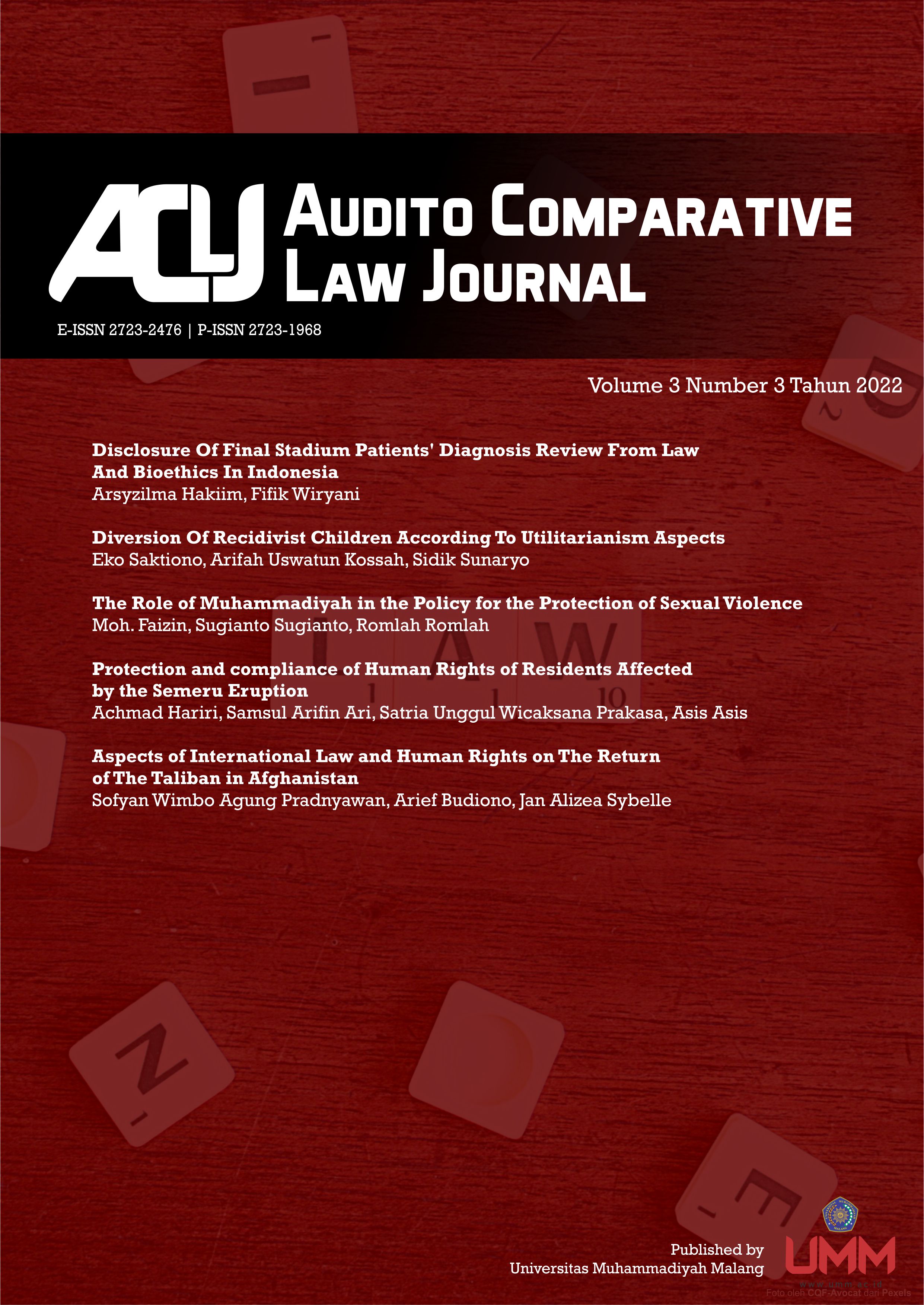Disclosure Of Final Stadium Patients' Diagnosis Review From Law And Bioethics In Indonesia
DOI:
https://doi.org/10.22219/aclj.v3i3.22195Keywords:
Truth disclosure, Final stadium, Law, Bioethics, IndonesiaAbstract
The relationship between doctor-patient rights and obligations, especially in hospitals, cannot be separated from conflicts or disagreements. These conflicts usually occur in special conditions that cause dilemmas in decision-making by doctors. Disclosure of the truth of the diagnosis in terminal patients or those suffering from end-stage disease is an ethical and legal issue that often occurs in health services. Problems occur, where on the one hand if the doctor tells the truth (reveals the truth) regarding the diagnosis/disease and on the other hand the doctor is worried that revealing the truth will have an impact that can worsen the patient's condition such as making the patient more depressed so that the patient can refuse further treatment. . But on the other hand, patients have the right to know information related to their illness. This research was conducted with a normative review approach. The results of this study found that disclosure of the truth about the end-stage disease can cause disturbances in psychological aspects and can potentially affect the patient's quality of life. The legal approach in disclosing the truth of end-stage disease through Law Number 36 of 2009 concerning health, Law Number 44 of 2009 concerning hospitals, and Law Number 29 of 2004 concerning medical practice is not fully the basis for the implementation of doctors in conveying the truth. Therefore, the bioethical aspect approach in this case through the principles of non-maleficence and respect for autonomy, truth disclosure can be done ethically and can minimize the negative impact of truth disclosure.
Downloads
References
Al-Fatih, S., & Siboy, A. (2021). Menulis Artikel Karya Ilmiah Hukum di Jurnal Nasional dan Internasional Bereputasi. Inteligensia Media.
Anita, A. (2016). Perawatan Paliatif dan Kualitas Hidup Penderita Kanker. Jurnal Kesehatan, 7(3), 508. https://doi.org/10.26630/jk.v7i3.237
Arifiyani, N., & Purnami, S. W. (2020). Indeks Prognostik Pada Pasien Kanker Serviks di RSUD dr. Soetomo Surabaya Menggunakan Model Regresi Cox Extended. Inferensi, 3(1), 37. https://doi.org/10.12962/j27213862.v3i1.6880
Atesci, F. C., Baltalarli, B., Oguzhanoglu, N. K., Karadag, F., Ozdel, O., & Karagoz, N. (2004). Psychiatric morbidity among cancer patients and awareness of illness. Supportive Care in Cancer, 12(3), 161–167. https://doi.org/10.1007/s00520-003-0585-y
Buckman, R. (1984). Breaking bad news: why is it still so difficult? British Medical Journal (Clinical Research Ed.), 288(6430), 1597 LP – 1599. https://doi.org/10.1136/bmj.288.6430.1597
Buken, N. O. (2003). Truth-telling information and communication with cancer patients in Turkey.
Carolina, P., Hermanto, H., & Katimenta, K. S. Y. (2021). Hubungan Pemenuhan Kebutuhan Spiritual dengan Kualitas Hidup Pasien Kanker. Jurnal Surya Medika, 7(1), 140–145. https://doi.org/10.33084/jsm.v7i1.2112
Childress, J. F., & Beauchamp, T. L. (2022). Common Morality Principles in Biomedical Ethics: Responses to Critics. Cambridge Quarterly of Healthcare Ethics, 31(2), 164–176. https://doi.org/10.1017/S0963180121000566
Clayton, J. M., Hancock, K., Parker, S., Butow, P. N., Walder, S., Carrick, S., Currow, D., Ghersi, D., Glare, P., Hagerty, R., Olver, I. N., & Tattersall, M. H. N. (2008). Sustaining hope when communicating with terminally ill patients and their families: a systematic review. Psycho-Oncology, 17(7), 641–659. https://doi.org/10.1002/pon.1288
Fallowfield, L. J., Jenkins, V. A., & Beveridge, H. A. (2002). Truth may hurt but deceit hurts more: communication in palliative care. Palliative Medicine, 16(4), 297–303. https://doi.org/10.1191/0269216302pm575oa
Irawan, E. (2013). Pengaruh perawatan paliatif terhadap pasien kanker stadium akhir (literature review). Jurnal Keperawatan BSI, 1(1). https://doi.org/https://doi.org/10.31311/.v1i1.84
Kaba, R., & Sooriakumaran, P. (2007). The evolution of the doctor-patient relationship. International Journal of Surgery, 5(1), 57–65. https://doi.org/10.1016/j.ijsu.2006.01.005
Mitchell, J. L. (1998). Cross-Cultural Issues in the Disclosure of Cancer. Cancer Practice, 6(3), 153–160. https://doi.org/10.1046/j.1523-5394.1998.006003153.x
Panagopoulou, E., Mintziori, G., Montgomery, A., Kapoukranidou, D., & Benos, A. (2008). Concealment of Information in Clinical Practice: Is Lying Less Stressful Than Telling the Truth? Journal of Clinical Oncology, 26(7), 1175–1177. https://doi.org/10.1200/JCO.2007.12.8751
Polesel, J., Furlan, C., Birri, S., Giacomarra, V., Vaccher, E., Grando, G., Gobitti, C., Navarria, F., Schioppa, O., Minatel, E., Bidoli, E., Barzan, L., & Franchin, G. (2017). The impact of time to treatment initiation on survival from head and neck cancer in north-eastern Italy. Oral Oncology, 67, 175–182. https://doi.org/10.1016/j.oraloncology.2017.02.009
Prawiroharjo, P., Meilia, P. D. I., & Hatta, G. F. (2020). Etika Menyampaikan Informasi Diagnosis Penyakit Terminal kepada Pasien sesuai Konteks Budaya Indonesia. Jurnal Etika Kedokteran Indonesia, 4(1), 13. https://doi.org/10.26880/jeki.v4i1.41
Sarafis, P., Tsounis, A., Malliarou, M., & Lahana, E. (2013). Disclosing the truth: a dilemma between instilling hope and respecting patient autonomy in everyday clinical practice. Global Journal of Health Science, 6(2), 128–137. https://doi.org/10.5539/gjhs.v6n2p128
Seshadri, K. (2020). Doctor–Patient Communication. In Effective Medical Communication (pp. 49–61). Springer Singapore. https://doi.org/10.1007/978-981-15-3409-6_5
Smajdor, A., Herring, J., & Wheeler, R. (2021). Oxford Handbook of Medical Ethics and Law. Oxford University Press.
Surbone, A. (2006). Telling the truth to patients with cancer: what is the truth? The Lancet Oncology, 7(11), 944–950. https://doi.org/10.1016/S1470-2045(06)70941-X
Vizcarrondo, F. E. (2019). Medical Futility in Pediatric Care. The National Catholic Bioethics Quarterly, 19(1), 105–120. https://doi.org/10.5840/ncbq20191919
Wijaya, Y. A., Yudhawati, N. L. P. S., & Andriana, K. R. F. (2022). The Role Of Nurses In Ethical Decision Making: In Literature Review Perspective. https://doi.org/https://doi.org/10.31219/osf.io/rs8pa
Zhang, Z., & Min, X. (2020). The Ethical Dilemma of Truth-Telling in Healthcare in China. Journal of Bioethical Inquiry, 17(3), 337–344. https://doi.org/10.1007/s11673-020-09979-6
Downloads
Published
How to Cite
Issue
Section
License
Copyright (c) 2022 Arsyzilma Hakiim, Fifik Wiryani

This work is licensed under a Creative Commons Attribution-ShareAlike 4.0 International License.








